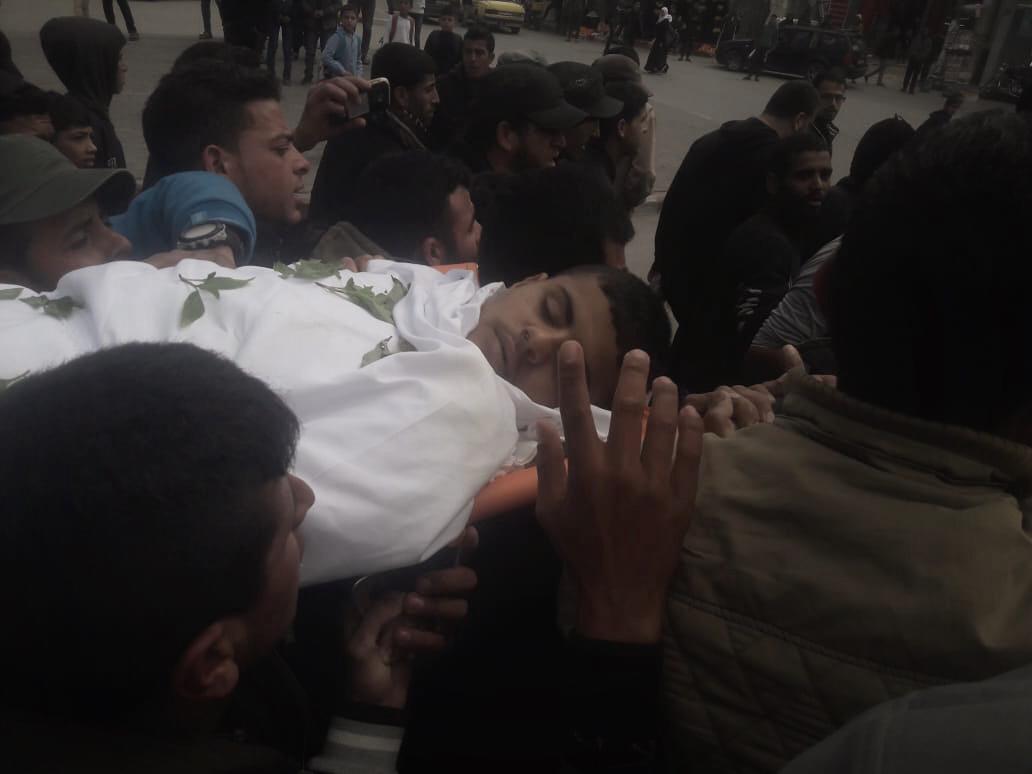'My heart is burning': Families of boys slain in Gaza anniversary protest mourn their losses
Two out of three 17-year-old boys killed in Great March of Return demonstration left school early to support their families

Hala al-Najjar, 38, holds her daughter, crying at home in Khan Younis after her son, Bilal, was killed (MEE/Sanad Abu Latifa)
 Motasem A Dalloul-31 March 2019 19
Motasem A Dalloul-31 March 2019 19
It was 4pm when Hala al-Najjar received a phone call, asking her to come visit her son, Bilal, at the hospital in Khan Younis.
“I was shocked and could not identify the caller. I ended the call immediately and collapsed. I lost consciousness for a couple of minutes and when I woke up I found my house full of relatives and neighbours and everyone was crying,” Najjar, 38, told Middle East Eye.
'It was the first time I looked at him and he didn’t look at me. My heart is burning'- Hala al-Najjar, 38, mother of Bilal al-Najjar
Bilal was one of three 17-year-old boys shot and killed during protests across Gaza on Saturday that drew tens of thousands of Palestinian demonstrators marking the first anniversary of the Great March of Return.
Mohammad Saad, 20, was also killed by wounds caused by shrapnel from Israeli shooting before the demonstrations started. More than 300 others were wounded. Adham Amara was shot in the face, Tamer Abu al-Kheir was shot in the chest and Bilal was shot in the abdomen.
According to Save the Children, the boys’ deaths brought the total number of children killed by Israeli forces in Gaza since the protest movement began to 52, with some 200 Palestinians slain overall as Israel has cracked down on protests that have been a weekly occurrence.
The UN has accused Israeli soldiers of intentionally shooting at civilians, warning they may have committed war crimes in their response to the protests. Doctors working on the frontlines have told MEE that wound patterns show snipers are intentionally shooting to maim a generation of young Palestinians.
Samir Zaqqout, deputy director of the Gaza-based Al-Mezan Centre for Human Rights, told MEE on Sunday: “If the international community remains unable to deal with these increasing violations, this will double the suffering of Palestinians in Gaza and will increase the number of victims among them.”

The risks, however, did not deter protesters from coming out on Saturday, calling for the right of return to homes from which their families fled in 1948 and an end of a grueling 11-year-old siege.
The blockade has left Gaza with one of the highest unemployment rates in the world, economic circumstances with which the slain boys were intimately aware.
'A mature man, not a boy'
Both Bilal and Tamer had left school early in order to support their families, their parents told MEE.
Hala al-Najjar said Bilal was a talented student, but stopped studying at the age of 12 to work in a clothing shop. He saved money from his job to buy a cart and donkey and went out on his own.
“He collected rubble from the streets, sold it and paid the money for us. He told me, ‘I want to help you see my brothers and sisters completing their schools’,” Najjar said.

“I saw him as a mature man, not a boy. I never thought he would come home dead and lying on a stretcher.”
Tamer was very ambitious, his parents said, but his aspirations had been crushed by the poverty of the refugee camp where he was born, like his father, Hashem, before him.
“I am very sad that I lost my dear son, but I do not imagine that we would stop the demonstrations before we get at least our urgent demand – breaking the siege and lifting the restrictions imposed on Gaza,” he told MEE. “We do not have work and we are unable to buy the basic needs of our children.”
Like Bilal, Tamar left school at an early age because his family could not afford related expenses, said his mother, Subhiyeh Abul-Kheir.
“He told me that he wanted to work and save his money in order to build an apartment and get married,” she said. “However, he worked and paid his money for us because his father is unemployed.”
Last year, the family was selected to receive an apartment in Hamad City, a housing project funded by Qatar. “We thought that we were near to achieving our son’s ambition, but in one minute, everything is gone,” she said.
Hala al-Najjar refused to visit Bilal in the ICU at Naser Hospital, hoping he would recover. Instead, he succumbed to his wounds and his body was brought to the family home.
“They brought him before me. It was the first time I wanted to stand up, but my feet didn’t work. They lowered him down and I bent over him. I hugged him and kissed him all over his face,” she said, sitting on an old mattress laid on a concrete floor, using a wall as a back rest. A dozen women surrounded her, trying to relieve her pain.
“It was the first time I spoke to him and he remained silent. It was the first time I looked at him and he didn’t look at me. My heart is burning.”

